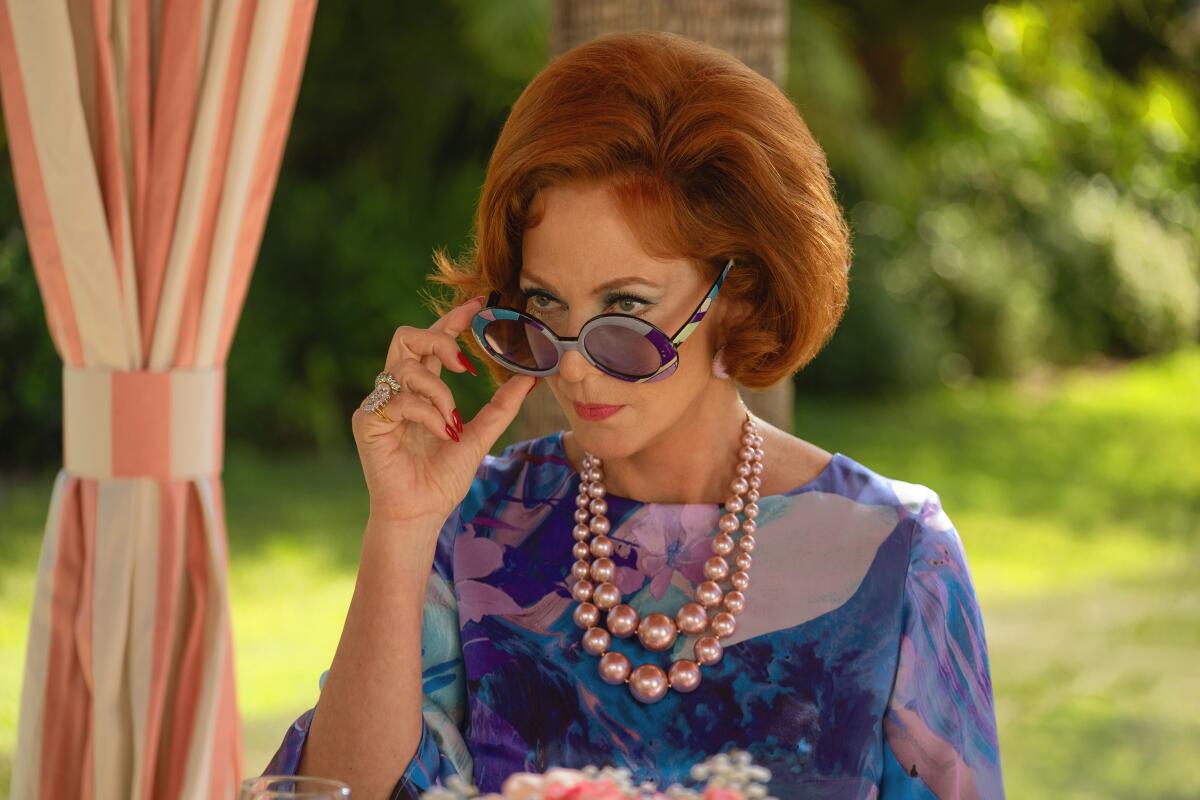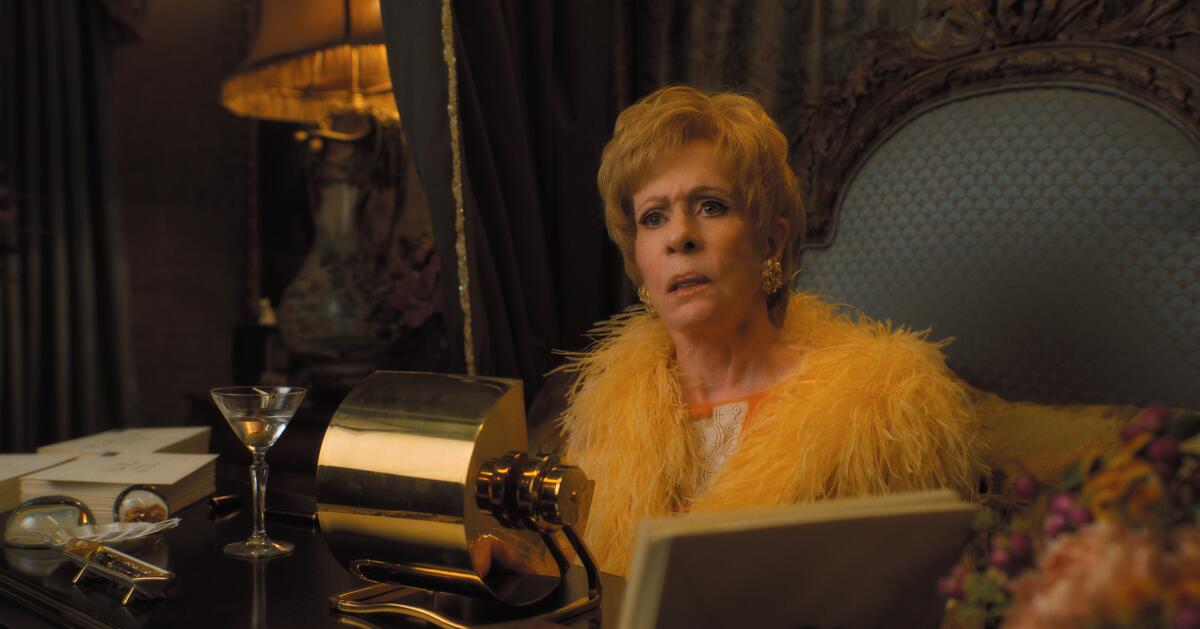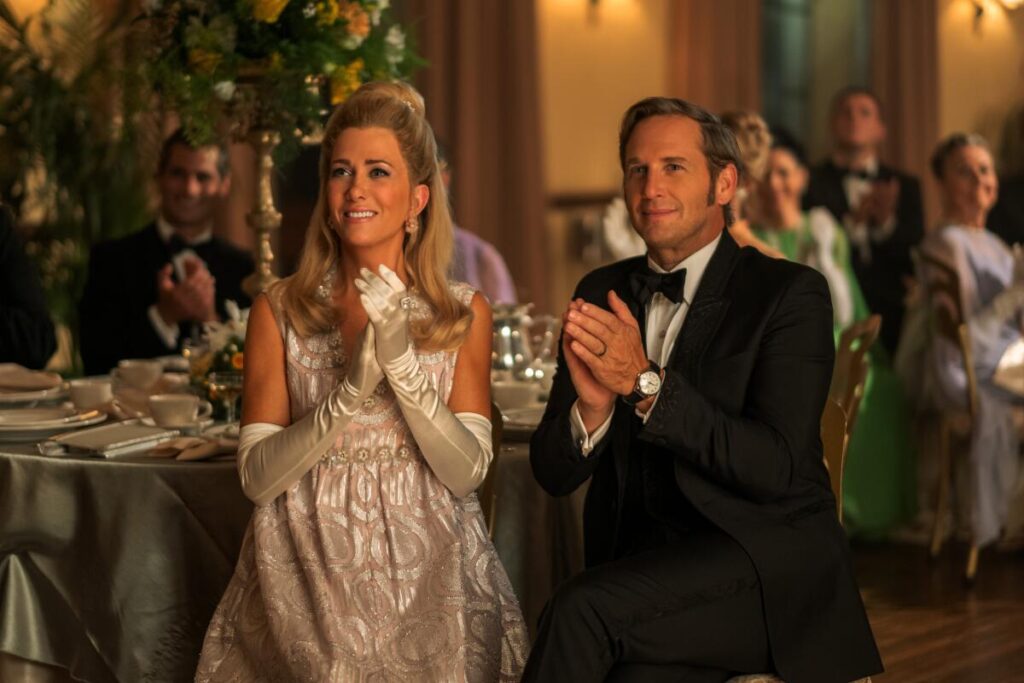I have not read Juliet McDaniel’s 2018 novel “Mr. and Mrs. American Pie,” which is nominally the basis of a new miniseries, “Palm Royale,” but it’s clear from the publisher’s synopsis that it’s a completely different story — though one that someone decided could be rebuilt into diverting, even brilliant television. As indeed it has been.
Set in 1969 in the painfully upscale, excruciatingly exclusive community of Palm Beach, Fla., the series, which premieres Wednesday on Apple TV+, has been given the star treatment, in terms of production and talent. Created by Abe Sylvia (“George & Tammy”), with its first four episodes directed by Tate Taylor (“The Help”), it stars Kristen Wiig, Laura Dern (who originally developed the property), Allison Janney, Ricky Martin, Leslie Bibb and Carol Burnett, with a supporting cast that also includes Julia Duffy (you loved her on “Newhart”), Mindy Cohn (ditto, “Facts of Life”), Dern’s father Bruce (screen royalty) and the great Paul Sand, 92, a frequent guest on Burnett’s variety show half a century ago.
And so kudos to casting directors Kerry Barden and Paul Schnee, as well as to production designer Jon Carlos and costume designer Alix Friedberg, who rate a mention right at the top. They’ve created a world that is at once extravagant and stylistically acute, surrounding characters who are themselves exaggerated but — for the most part — this side of grotesque.
Maxine Dellacorte Simmons (Kristen Wiig), left, with her husband Douglas Dellacorte Simmons (Josh Lucas) in the Episode 1 of “Palm Royale.”
(Apple TV+)
Wiig plays Maxine Dellacorte Simmons, wife of airline pilot Douglas Dellacorte Simmons (Josh Lucas), who would prefer to be known as Maxine Dellacorte, a name that carries weight in Palm Beach. (Doug’s aunt Norma, played by Burnett, a plastics and mouthwash heiress, ruled the town until an embolism put her in a coma; there is now a power vacuum.) Maxine, who believes in love and beauty, grew up an orphan in Tennessee, where somehow she became a regular reader of the Palm Beach Daily News, nicknamed the Shiny Sheet (the paper and the nickname are real), whose society pages formed her idea of glamour and what it would mean to be “somebody.” The series is concerned with her attempts to make that happen.
Palm Royale is the beach club that epitomizes her dream; Maxine literally scales its walls. There she encounters a quartet whose names she knows as well as her own: Evelyn Rollins (Janney), “the self-appointed queen bee,” as described in Maxine’s introductory narration; Dinah Donahue (Bibb), “the ambassador’s wife … poised to dethrone Ms. Evelyn if her libido didn’t get the better of her”; Mary Jones Davidsoul (Duffy), “the widow, who was as fizzy and dizzy as a glass of Champagne”; and Raquel Kimberly-Maco (Claudia Ferri), “the sugar heiress with $30 million to spare and a mobster husband.”
“You’re family to me,” she tells them. They regard her as an annoying interloper, and she is quickly ushered from the grounds by Robert (Martin), the club bartender, who also happens to live in Norma’s pool house. But that is just where the story begins.
Maxine has more successfully inserted herself into Norma’s life, or at any rate into the room she occupies in a five-star nursing home, since Norma is unable to protest. “You are too good to me, Norma,” says Maxine, who borrows her clothes, and more. “I’m going to make you so proud.” That she expects that, as Norma’s only living relative, Doug will inherit her millions is not a particularly good look; she has appointed herself her caretaker, even as she waits for Norma pass on.

Evelyn Rollins, played by Allison Janney, is the “the self-appointed queen bee,” according to Kristen Wiig’s Maxine.
(Apple TV+)
For contrast, we have Dern’s Linda — long, lank hair, under a floppy felt hat — who approaches Maxine outside a nail salon in downmarket West Palm Beach, to talk about “raising the collective consciousness of the global sisterhood.” With Virginia (Amber Chardae Robinson), she runs a women’s group at a feminist bookstore, Our Bodies Our Shelves. There are political threads strung through the series — we see Nixon on television now and then, speaking of Vietnam or protests against the war there — but they are there more to animate the farce than as substantial social comment.
Social climbing is the subject of a great body of literature and film and films based on literature — “Vanity Fair,” “Gentlemen Prefer Blondes,” “The Talented Mr. Ripley” (getting its own miniseries adaptation next month), “Six Degrees of Separation,” “What Makes Sammy Run,” “How to Succeed in Business Without Really Trying,” “Room at the Top,” it goes on. In some cases, the climbers triumph; in others, they’re slapped back down.
All but the most over-privileged will understand that Maxine’s dreams are misplaced, that she fundamentally misunderstands what constitutes a good life. Indeed, none of the women she envies are actually happy; the pursuit of wealth in this telling is toxic. And yet Maxine is a good person, whose schemes and trespasses one does not quite forgive, but makes allowances for against hopeful future corrections. She lies to herself, but she is also not a good liar; she’s aware, and unaware. (“Silly goose,” says Diana. “So wise about some things, so naive about others.”)
The pursuit of her dreams will create complications, like Lucy Ricardo trying to break into show business. And though Maxine will be blamed for things that aren’t really her fault, in the sense that her presence destabilizes a rigidly defined world — a society held together by fear, where everyone has secrets, whose revelation might be liberating in the short run but destructive in the long — they kind of are. “There’s a fine line between madwoman and dreamer,” Maxine will observe, from the vantage of that line.
Burnett, 90, spends the early episodes comatose, but you don’t hire Carol Burnett just to keep her a body in a bed, and she will emerge by stages, eyes first, as a formidable character, and the vessel of some of the series’ funniest moments. Yet “Palm Royale” is above all Wiig’s show, and she is terrific and genuine, alive in her role from moment to moment. It’s a complex performance, funny and painful and endearing, shot through with hope and fear, sass and sadness; Wiig makes it impossible not to feel for Maxine, determined, in a great phrase “to maintain a posture of relentless positivity”; we root for her happiness more than for her success.

Carol Burnett spends the early episodes of “Palm Royale” comatose, but awakens and delivers some of the series’ funniest moments.
(Apple TV+)
But even characters who in a lesser piece would be frozen into caricatures are granted some depth and fluidity, which helps sustain the series over 10 episodes. (Maxine’s evolving relationship with Robert is especially important.)
Now, as to the ending. No spoilers here, but you might not want to read this paragraph until after you’ve watched for yourself. Let me say that I loved this series almost all the way through, even as later episodes grew more flagrantly absurd, and perfectly impossible things occurred. As the story nears the end, with so many characters backed into a corner and new crises arising, one wonders if there isn’t some extra episode hiding just out of sight. (It may be helpful to note — and I mean actually make a note, so you’ll remember — some flash-forward narration at the beginning and end of the first episode.)
A climactic performance of a customized version of the Peggy Lee hit “Is That All There Is?” echoes a key question of the series, though its text is interpreted differently by different characters. But it is also a question that is liable to arise in the mind of a viewer as the series blinks out.
The finish isn’t arbitrary; there’s a thematic and clockwork logic to it, and it’s somewhat reminiscent of films from the time in which the series is set. It’s not a case of “everyone gets run over by a truck.” Yet as a fulfillment of what had gone before, I found it unsatisfying, out of key and sort of unfair. Life isn’t fair, but fiction owes us something more.
Your mileage might vary, and I wouldn’t scare you off; there is simply too much to admire and enjoy along the way. But I had to say something, you know, as a professional. Happy to hear your thoughts.

